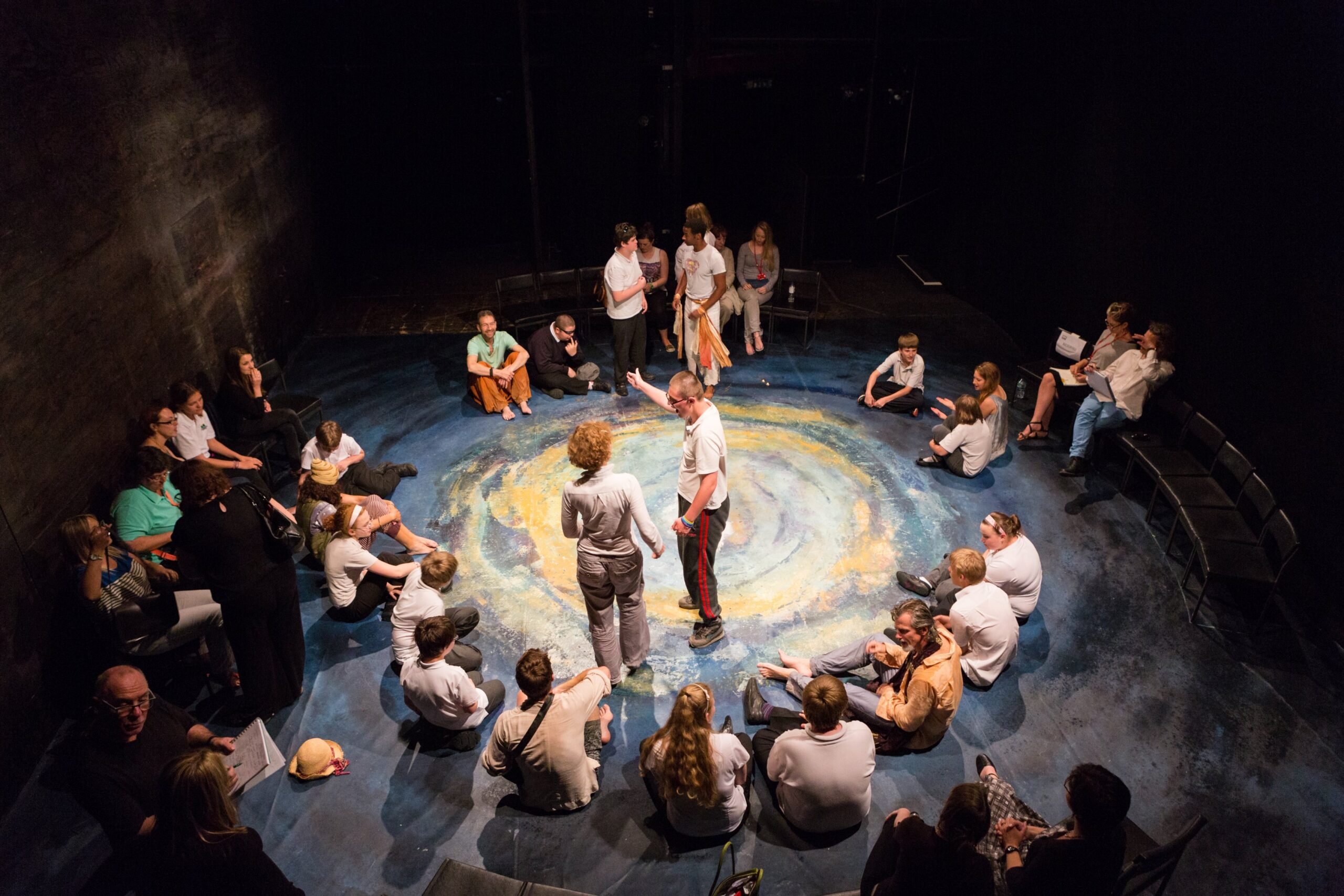
Children rehearsing a production of The Tempest
Photo: Lucy Barriball
Theatre is for everyone
Within the past year the RSC has integrated relaxed performances into its season planning. Jacqui O’Hanlon tells how this has come about.
The RSC has a long history of creating innovative family productions, from the Lion, the Witch and the Wardrobe to Beauty and the Beast and also Matilda, The Musical! Last year, alongside ten other theatres and at the invitation of the Prince’s Foundation for Children and the Arts we took part in a pilot relaxed performance of our Christmas production of The Mouse and his Child. Fast-forward to September 2014 and we are now starting preparations for our fourth relaxed performance with our family production of The Christmas Truce. In the intervening time, having done relaxed performances of Wendy and Peter Pan and Matilda, The Musical! in the West End earlier this year, the performances have now become a regular part of our artistic programme and are simply part and parcel of what we do.
It is one of the very rare occasions when families are able to attend a cultural event together
It seems incredible now that, in this relatively short period of time, these performances have become such an integrated part of our season planning. This is due in large part to the positive reactions of audiences seeing the work. Relaxed performances offer a theatrical experience to an audience of children and young people with autistic spectrum conditions and/or learning disabilities who might otherwise feel excluded from live theatre. Very simply, the usual rules of theatre-going are relaxed with specially created chill-out zones so that any member of the audience can take a break from the action if they need to. Lighting and sound levels are adjusted, with no full black-outs and the volume of sound effects and music lowered. The staff and actors on the show are briefed to expect a lot more noise in the auditorium, sometimes involuntarily noise from audience members and sometimes just noisier responses to whatever is happening on stage.
Audience experiences of these performances differ between Stratford and London insofar as the London families have a lot more choice – undoubtedly due to the ongoing work of the Mousetrap Foundation, West End Theatres, SOLT, the National Theatre and the National Autistic Society. However, most agree that it is one of the very rare occasions when families are able to attend a cultural event together and which all of them, from parents to siblings, can enjoy. Comments such as the following are common: “We enjoyed all of it. It was especially nice to not have to worry about sssshing” and “The best thing was knowing that it was okay for my son to go out for a while without disturbing the performance… however, because of the relaxed atmosphere and fabulous music, he sat still for the whole performance!”
Reaching new audiences is an ongoing priority and we continue to explore new approaches to programming, including the unique provision of free broadcasts into UK schools so that pupils can watch our work in their own environments with supporting wraparound materials for teachers and a sign language interpreter for deaf and partially hearing students. We also commissioned Kelly Hunter to create a production of The Tempest specifically for children with autism, an addition to our Midsummer Mischief Festival of new work in Stratford this summer.
As yet there is very little formal research available about the impact of relaxed performances on audiences and organisations (Andy Kempe at Reading University has published the only research I am aware of). Theatre is for everyone and we need to continue to use creative approaches to adjust the way we behave in order to ensure that everyone really does feel properly welcomed and able to participate in our work. Relaxed performances are one way we can do that.
Jacqui O’Hanlon is Director of Education at the RSC.
www.rsc.org.uk
Join the Discussion
You must be logged in to post a comment.